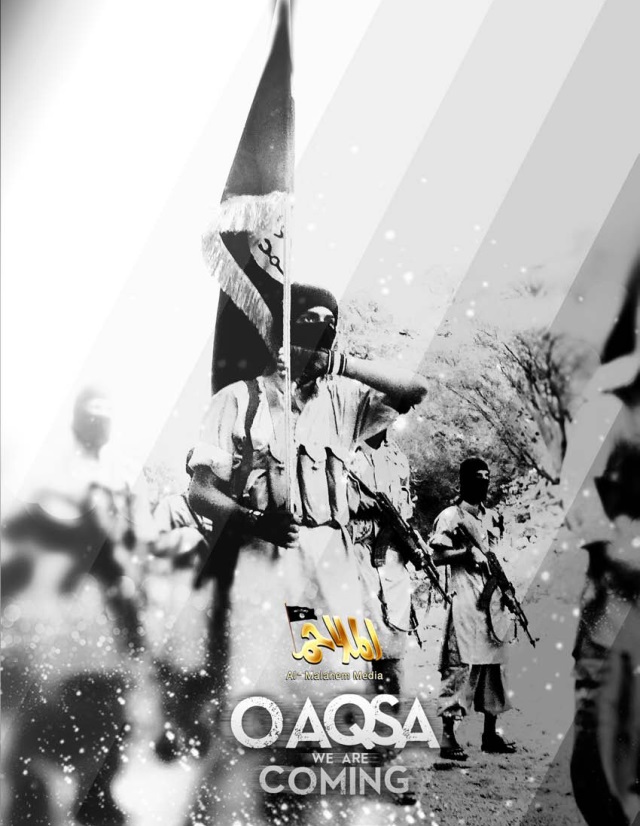TARGET: JORDAN
TARGET: JORDAN
By Michael S. Smith II, with contributions from Cindy Storer
The Islamic State will play right into al-Qa’ida’s hands by trying to open a new jihad theater in the Hashemite Kingdom of Jordan. The Government of Jordan should avoid doing the same.
Just as al-Qa’ida has done since the Arab Spring, the organization that was ejected from al-Qa’ida last year is investing heavily in efforts to flank Israel. Islamic State, or DA’ISH, has expanded its forces in the Sinai and is developing a rear operating base in Libya, from which it will move people and resources to support the jihads being waged in Syria and the Sinai. Now there is mounting evidence the group aspires to expand its operations to Israel’s eastern doorstep by opening a new jihad theater in Jordan. Given this strategic picture, Jordan’s decision to try to enlist the support of an al-Qa’ida-affiliated cleric, Mohamed al-Maqdisi, for efforts to thwart DA’ISH’s capabilities to wreak havoc in the country may be ill-considered. Because al-Qa’ida will almost certainly stand to benefit from any instability fomented in Jordan by DA’ISH, and al-Maqdisi has been very instrumental in helping al-Qa’ida secure important resources it will deploy to do so.
DA’ISH’s Movement Toward War with Jordan
According to a Jordanian official, Lieutenant Mu’ath al-Kaseasbeh was burned alive roughly a month before the video documenting his horrific murder was broadcast to the world via social media platforms like Twitter on February 3, 2015. In the video, Lt. al-Kaseasbeh divulged important details concerning the anti-DA’ISH coalition’s activities, some of which were covered in an interview with him that the Islamic State published late in December 2014 in the sixth edition of its English-language magazine, Dabiq. Interestingly, also in the video, he expressed misgivings concerning Jordan’s counterterrorism partnership with Israel.
Among the details provided by Lt. al-Kaseasbeh was a list of the countries supporting airstrikes that, according to him, the US is planning from bases in Qatar. Also shared was a list of bases from which operations are launched, such as Muwaffaq al-Salti Air Base, the base in Jordan from which Lt. al-Kaseasbeh departed on his final mission on 24 December 2014.
The same day the video documenting Lt. al-Kaseasbeh’s murder was released, in addition to promoting a lengthy hit list comprising “apostate” pilots’ names, DA’ISH distributed via Twitter at least four “Wanted Dead” posters containing photos of military pilots stationed in Jordan. Marked “Crusader ID,” the posters match the “Security Database” materials highlighted in the computer animation-intensive video produced to broadcast footage of the murder of Lt. al-Kaseasbeh.
The four posters provide information about Major Qays Ahmad Ar-Rawashah, Major Ata Nawif as-Sarayrah, First Lieutenant Abdullah Hasan al-Manasir of Jordan, and Captain Uday al-Qarallah. Address details in Jordan are provided for each pilot, along with satellite images of those locations that were likely generated using Google Maps. In addition, a Facebook page address is provided for Lt. al-Manasir, whom, according to the poster featuring information about him, resides at Muwaffaq al-Salti Air Base.
More recently, DA’ISH released an Arabic-language audio message that calls attention to the hit list.
Clearly, DA’ISH is planning to go to war with Jordan. And other indicators of these plans are also discernible via social media.
These include expanded calls during the weeks prior to the release of the video of Lt. al-Kaseasbeh’s demise for DA’ISH members and supporters to take more precautions when utilizing wireless networks that foreign intelligence organizations may monitor to identify their locations, networks, and movements. With these warnings came a set of “safety tips.” Also provided were tips for thwarting investigators’ efforts to monitor the communications of DA’ISH’s members via social media platforms like Twitter.
The latter of these developments came to the attention of the DOWNRANGE team (ie Kronos Advisory’s analysts and subject matter experts) when an account the team uses to monitor DA’ISH propaganda and its fighters’ real-time updates from battle zones was blocked by several popular accounts managed by DA’ISH propagandists. This account was also added to a long list of accounts amassed by a Twitter account that is dedicated to highlighting accounts which DA’ISH cyber operatives suspect are used to snoop on their brothers and sisters.
But perhaps more telling of the group’s plans than signs that DA’ISH was battening down the hatches to prepare for conflict with Jordan is this: On January 31, 2015, hours before the release of the video showcasing the beheading of Japanese hostage Kenji Goto, DA’ISH released a video to highlight the capture and beheading of an alleged Jordanian “intelligence agent.” (A screenshot of this video that we provided Fox News Channel is available here.)
Although given little attention by most Western news organizations, like the more horrific video featuring the interrogation and murder of Lt. al-Kaseasbeh, this was a very bold provocation of the Hashemite Kingdom. Indeed, it was a signal that Jordanian military members and intelligence operatives are priority targets for the group — a fact made clearer by the release of “Wanted Dead” posters featuring addresses for Jordanian pilots days later.
At the time of this material’s publication, DA’ISH has had roughly a month to plan attacks targeting airbases throughout the region used to support airstrikes against the group. It may also have used this time to develop assassination plots targeting Jordanian military pilots. Plus it is providing individuals sympathetic to the group tools to locate these human targets in Jordan.
Fortunately, Jordan is well-equipped to address these threats. The country’s intelligence community has a strong track record of thwarting the activities of numerous terrorist groups. Not the least of which being al-Qa’ida elements active in Iraq during the past decade; a majority of which are now members of the al-Qa’ida offshoot that calls itself the Islamic State.
Indeed, in the near term, it is likely any significant movement toward crippling DA’ISH’s top-down-directed operations by rapidly killing all of its leaders and the clerics consulted in the process of appointing their replacements will be the fruits of the Jordanian intelligence community’s field activities in Iraq and Syria.

Mohamed al-Maqdisi
Jordan’s Unforced Error
Meanwhile, for the Hashemite Kingdom, equally important is the matter of thwarting DA’ISH’s influence operations targeting Jordanians, as well as Palestinian and Syrian refugees living in the country. However, the government of Jordan’s obvious plans to enlist a top ideologue from the Global Jihad movement, Mohamed al-Maqdisi, in those efforts reveals the Kingdom is in a desperate situation. It also reveals a dangerous quotient of shortsightedness on the parts of Jordanian officials. For al-Qa’ida, which has long considered Jordan an important target, will almost certainly benefit from any campaign Jordan wages against DA’ISH that serves to elevate the profile of a de facto al-Qa’ida recruiter like al-Maqdisi.
Al-Maqdisi was a mentor to al-Qa’ida in Iraq’s founding emir, the Jordanian-born jihadist Abu Musab al-Zarqawi. Eventually, however, al-Maqdisi joined then al-Qa’ida deputy commander Ayman al-Zawahiri, who presently helms al-Qa’ida, in voicing criticisms of al-Zarqawi’s brutal tactics targeting Muslims in Iraq — manifestations of the overtly takfirist tendencies that pervade DA’ISH’s strategic contemplations to this day.
Takfir is the contentious practice of one Muslim accusing another of having turned their back on their faith, or, more specifically, committing apostasy. According to jihadis, apostasy is punishable by death.
Today, the leaders of DA’ISH overtly proclaim the practice of takfir is essential to the expansion of their “caliphate.” Indeed, all Muslims who refuse to pledge allegiance to the emir of DA’ISH have reasons to be fearful of the group’s adherents. For, according to DA’ISH’s leaders, anyone who refuses to pledge allegiance to the “caliph” is violating an important feature of Islamic traditions, and should be killed or enslaved.
On the other hand, al-Qa’ida’s current leader has long endeavored to counter portrayals of the group as a band of takfiris. Hence his admonishment of al-Zarqawi for his tactics in a letter which noted al-Qa’ida’s senior-most leaders were concerned al-Zarqawi’s brutal terror campaigns targeting Muslims would undermine their goal of building popular support for al-Qa’ida among Iraqis.
Last year, al-Maqdisi sided with al-Qa’ida against DA’ISH after his attempt to help al-Qa’ida restore a critical component of its organizational infrastructure in the Middle East failed. This, when his effort to broker reconciliation between the leaders of Jabhat al-Nusrah, the official manager of al-Qa’ida’s Syria portfolio, and ISIS, the group that rebranded itself as the Islamic State soon after it was ejected from the al-Qa’ida fold in February 2014, worsened tensions between their groups.
After his efforts failed, al-Maqdisi joined with al-Qa’ida and other jihadist elements that have rejected DA’ISH’s claim it has established a caliphate. With this rejection, they also rejected DA’ISH’s demands that all Muslims striving to “restore” the caliphate should pledge allegiance to the terrorist formerly known as Abu Bakr al-Baghdadi, now known to his followers as “Caliph Ibrahim.”
Upon al-Maqdisi’s release from prison in early February 2015, a senior leader of Jabhat al-Nusrah took to Twitter to celebrate the development. While the Islamic State has captured the interest of most major news networks for months, during this time, al-Nusrah has been growing its power base in Syria. And al-Maqdisi will once more play an instrumental role in bolstering al-Nusrah’s capacity to attract recruits, particularly foreign fighters who might otherwise join DA’ISH.

Mohamed al-Maqdisi
A View to AQ’s Strategy
While foreign fighters consider supporting the Syrian Jihad to be an individual obligation for all Muslims, because they are less susceptible to the parochial concerns that typically factor into the larger sets of interests of Syrian and Iraqi jihadis, foreign fighters are also the ones whom al-Nusrah will rely upon most to support Ayman al-Zawahiri’s goal of expanding al-Qa’ida’s operations in proximate environs. This, in order to establish the logistical infrastructure required to wage a sustainable jihad against Israel — a plan highlighted in an unusually brief missive from al-Zawahiri released in mid-2011 to proclaim al-Qa’ida’s support for the revolution in Syria, titled “The Glory of the East Begins with Damascus.”
To open a jihad theater in Israel — and thereby galvanize support for al-Qa’ida versus DA’ISH within Salafist and jihadist spheres the world over — al-Qa’ida will almost certainly seek to encircle it, as this will serve to spread thinner resources Israel will have available to respond to each front of al-Qa’ida’s advance. In turn, this will help al-Qa’ida engineer an aura of strategic prowess for its jihad against Israel, which is likely to help al-Qa’ida cultivate more support for the effort from more members of the Global Jihad movement. Plus, by engaging Israel from the north, east and south, al-Qa’ida will establish more access points for jihadis to join the fight at an early stage than if al-Qa’ida were to launch such a war from the Sinai alone.
Therefore, inasmuch as al-Qa’ida is working to establish forces and rear operating bases in Syria and the Sinai that will be used to assault Israel, in these places it is securing the territorial, human and logistical resources needed to first expand into Jordan.
Meanwhile, that Jordan would allow a de facto al-Qa’ida recruiter to resume his “dawa” does not bode well for the West. Particularly as al-Maqdisi’s messages can serve to enhance the appeal of al-Qa’ida’s Syria network in the eyes of new arrivals to the Syrian Jihad.
Indeed, it is known Jabhat al-Nusrah and the senior al-Qa’ida operatives dispatched to Syria to assist al-Nusrah are recruiting foreign fighters al-Qa’ida plans to use in support of its operations in Europe and North America. Those skeptical about the inclinations of senior figures in al-Qa’ida’s Syria network to support al-Qa’ida’s activities in the West should take note of the messages posted to Twitter on February 1, 2015 by Sanafi al-Nasr, a senior figure in the so-called “Khorasan Group” who had not posted any messages since late in December. In these messages, al-Nasr, who in recent years has probably had more access to fighters from the West than any other senior al-Qa’ida operatives, celebrated the attacks in Paris targeting employees of Charlie Hebdo. As al-Nasr and his associates have been under intense pressure since members of the anti-IS coalition began launching airstrikes in Syria and Iraq, and as issuing these tweets was a risky move because this may have exposed his location, their contents are a very strong signal concerning his priorities.

Mohamed al-Maqdisi
The Means to These Ends
Indeed, support from influential jihadist ideologues like Mohamed al-Maqdisi fuels al-Qa’ida’s capabilities to attract the human and other resources needed to achieve important objectives — such as expanding its presence in Jordan — that comprise its larger strategy to establish the infrastructure needed to threaten Israel.
Al-Maqdisi may be able to deter foreign fighters from joining DA’ISH, thus reducing that group’s access to key instruments that may be deployed to expand its operations beyond Syria and Iraq. Concurrently, however, he will almost certainly help al-Qa’ida attract more of the manpower it needs to realize a similar set of objectives.
Presently, it appears DA’ISH will be playing right into al-Qa’ida’s hands by orienting its resources toward fomenting chaos in Jordan. For this will foster an atmosphere al-Qa’ida may leverage as a tool to eclipse the specter of DA’ISH by encircling and attacking Israel — a play that will bolster perceptions of al-Qa’ida as the true “vanguard” of the global jihadist cause.
And by helping to boost the profile of an ideologue like al-Maqdisi, whose “dawa” has served to encourage jihadis to support al-Qa’ida versus DA’ISH, the government of Jordan is accelerating al-Qa’ida’s capabilities to achieve these ends.

Final Page of the Winter 2014 editon of al-Qa’ida’s leading English-language publication, Inspire




